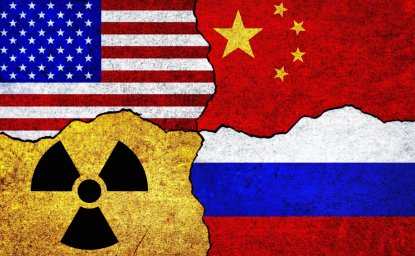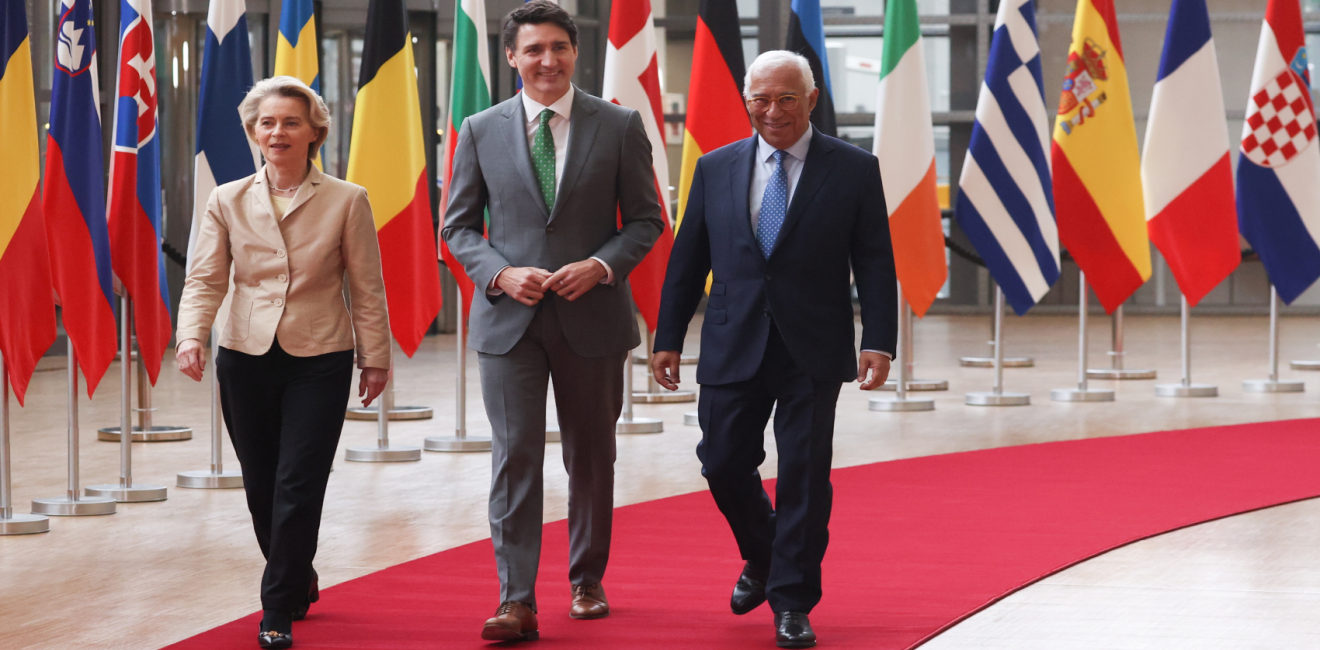The Canada-EU Leaders’ meeting took place on February 12, 2025. Canadian Prime Minister Justin Trudeau, European Commission President Ursula von der Leyen and European Council President Antonio Costa met to discuss ways for EU and Canada to work more closely to promote global economic security and stability amidst rising geoeconomic tensions. The Wilson Center experts shed light on the key takeaways of the meeting and what they mean for the future of Canada-EU relations.
Michelle Egan, Global Fellow, Global Europe Program
For decades, the European-Canadian relationship has been important but often secondary to that of the United States for both partners. Yet recent announcements by the new US administration, coupled with President Trump’s hints at shifting from economic maneuvers to territorial aspirations, have highlighted their common interests. With the recent EU-Canadian Leaders’ Summit in Brussels between Prime Minister Justin Trudeau, European Council President António Costa and European Commission President Ursula von der Leyen, both sides are looking to strengthen their transatlantic ties amid geopolitical instability and economic disruptions that challenge the rules-based international order. Though the EU and Canada have the CETA trade agreement—which they have touted as important for trade and investment—and a critical minerals partnership, in a hyper-competitive global economy they need to further deepen and strengthen economic ties.
Both have highlighted the need to drive innovation and economic growth. They have also adopted economic security and supply chain resilience measures. PM Trudeau attended the AI Summit, and signed the Council of Europe Framework Convention on Artificial Intelligence and Human Rights, Democracy and the Rule of Law, showcasing shared ground for transatlantic cooperation and global progress on AI. Canada's Artificial Intelligence and Data Act (AIDA) and the EU AI Act seek to assess the risks that AI poses to human rights, democratic institutions and the rule of law. Yet notably, the summit highlighted common interests, including expected tariffs by the United States, decarbonization through a green hydrogen supply chain with Europe, and support for Ukraine.
Amid the tensions and threats from Washington, the tone in Brussels was one of “good allies" and "trusted friends" that support each others’ international commitments. The underlying message was that, despite an uncertain relationship with the United States, both remain a "reliable and predictable partner" demonstrated by the rising bilateral trade under CETA , which should be further boosted as part of their efforts to limit the impact of US economic policies. Both Canada and Europe sent a clear message they want to diversify trade, expand markets through continued trade negotiations, and promote multilateralism.
Madison Lipson, Associate, Canada Institute
Embattled Canadian Prime Minister Justin Trudeau met with European leaders in Brussels this week as the United States announced sweeping new tariffs on steel and aluminum. With President Donald Trump confirming a 25% tariff on all steel and aluminum imports—alongside a separate, still-pending tariff specifically targeting Canada and Mexico, which would be stacked to a whopping 50%—Trudeau arrived in Europe seeking to reinforce economic alliances and push back against US protectionism.
Unlike Mexico, which has responded with cautious diplomacy, Trudeau took a firm stance, vowing to match US tariffs “unequivocal[ly]”. His message to European allies was clear: deeper Canada-EU cooperation is not just beneficial—it’s essential in an era of economic unpredictability.
At a joint press conference, Trudeau emphasized that partnerships like NATO and Comprehensive Economic and Trade Agreement (CETA) thrive on trust. “You can always trust Canada,” he told reporters, highlighting how CETA has increased Canada-EU trade by 66% since 2017. French President Emmanuel Macron echoed this sentiment—much to the chagrin of many French lawmakers—reaffirming CETA’s role in strengthening transatlantic trade.
Yet, as US protectionism escalates, Canada and Europe must look beyond existing agreements. Expanding cooperation in critical sectors like minerals, clean energy, and technology could help both sides reduce dependence on the US market and build a more resilient economic framework.
With tensions rising, Trudeau’s visit underscored the stakes. Rather than waiting for Washington’s next move, Canada and the EU must act decisively—because in an era of shifting alliances, economic security is national security.
Dimitris Tsarouhas, Global Fellow, Global Europe Program
Relations between Canada and the European Union have flourished in recent years, especially following the signing of the 2017 Comprehensive Economic and Trade Agreement (CETA). In their recent meeting in Brussels, the two sides asserted their willingness to deepen commercial ties and ensure that firms on both sides of the Atlantic benefit more from CETA provisions. Simultaneously, the EU and Canada utilized the meeting to further discussions on enhancing their security and defense cooperation. Since 2021, Canada’s participation in the EU’s Military Mobility project, alongside the United States and Norway, has boosted EU-NATO cooperation and has become yet more relevant since Russia’s invasion of Ukraine in 2022.
The meeting occurred amid Washington's numerous initiatives and announcements. The elephant in the room was President Trump’s administration, as both sides sought to coordinate their responses to the President’s announcements on tariffs and Ukraine. Brussels and Ottawa share a commitment to a rules-based, liberal international order, and the meeting confirmed their united stance in support of Ukraine, as well as their dedication to a WTO-based trade system.
Both sides have good reason to worry; they face the very real prospect of higher tariffs, which could undermine economic growth, as well as the risk of peace talks on Ukraine progressing without their involvement. Given the EU’s significant financial contributions to Kyiv since 2022, this would constitute a serious blow.
In order to prevent this situation, Brussels and Ottawa must enhance their coordination efforts and develop effective strategies for constructive engagement with the new administration in the United States.
Authors

Professor and Jean Monnet Chair ad personam, School of International Service, American University


Professor of International Relations; Head, EU Projects and Partnerships at the Center for EU and Transatlantic Studies (CEUTS), Virginia Tech; Adjunct Professor, Georgetown University; Jean Monnet Chair in European Politics

Global Europe Program
The Global Europe Program is focused on Europe’s capabilities, and how it engages on critical global issues. We investigate European approaches to critical global issues. We examine Europe’s relations with Russia and Eurasia, China and the Indo-Pacific, the Middle East and Africa. Our initiatives include “Ukraine in Europe”—an examination of what it will take to make Ukraine’s European future a reality. But we also examine the role of NATO, the European Union and the OSCE, Europe’s energy security, transatlantic trade disputes, and challenges to democracy. The Global Europe Program’s staff, scholars-in-residence, and Global Fellows participate in seminars, policy study groups, and international conferences to provide analytical recommendations to policy makers and the media. Read more


Canada Institute
The mission of the Wilson Center's Canada Institute is to raise the level of knowledge of Canada in the United States, particularly within the Washington, DC policy community. Research projects, initiatives, podcasts, and publications cover contemporary Canada, US-Canadian relations, North American political economy, and Canada's global role as it intersects with US national interests. Read more

Explore More
Browse Insights & Analysis
US Inaction Is Ceding the Global Nuclear Market to China and Russia

Promoting Convergence in US-Brazil Relations




